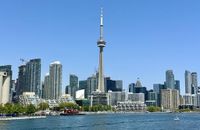As Canada approaches the April 28, 2025 federal election, candidates are gearing up to address key issues that resonate with voters across the nation. Advance voting begins today, April 18, and candidates are eager to showcase their platforms and connect with their constituents.
Among the candidates, Maureen McLeod stands out as the Liberal Party's representative for Grande Prairie. With a history of public service and a focus on critical sectors, McLeod aims to bring substantial changes that benefit her community. "We will make permanent the doubling of the revenue protection of farmers under the Agri-Stability Program—$6 million per farm, in the case of significant revenue drops caused by, for example, tariffs," she stated, highlighting her commitment to supporting local farmers amid ongoing trade tensions with the United States.
McLeod also emphasized the importance of building domestic processing capacity, proposing a $2 million fund for food processing. "As your MP, I would personally champion Grande Prairie as a new processing plant site," she added, underlining her dedication to local economic growth.
In addition to agriculture, McLeod's platform includes ambitious plans for energy and worker support. She advocates for a streamlined federal project approval process, aiming to reduce decision-making time from five years to two for major projects. Furthermore, she proposes a new upskilling and training benefit of up to $15,000 for workers in the middle of their careers and an $8,000 apprenticeship grant for registered apprentices.
The election is not only pivotal for local candidates like McLeod but also for the national landscape as parties outline their strategies for addressing pressing issues such as housing, healthcare, and crime. The Liberal Party, currently led by Prime Minister Mark Carney, is facing off against the Conservative Party, led by Pierre Poilievre, in a race defined by economic anxiety and international relations.
As the campaign heats up, CityNews has been investigating how various parties plan to tackle issues affecting the Greater Toronto Area, including transport, infrastructure, housing, health, and crime. Advance voting days are crucial, and the parties are under pressure to present comprehensive and fully costed platforms.
The Green Party of Canada has already released its full platform, committing to zero-carbon public transit by 2040 and proposing the construction of 1.2 million permanently affordable homes across Canada over the next seven years. Their plans include dedicated funding for operational and capital expenditures, starting in 2026.
The Conservative Party has focused on crime and safety, proposing mandatory three-year sentences for repeat auto theft offenders and stricter bail laws for serious offenders. Their platform emphasizes tough-on-crime policies, aiming to bolster public safety in urban centers.
Meanwhile, the New Democratic Party (NDP) has made significant statements addressing public transport and crime. They advocate for increased funding for public transit improvements and support for rail services, emphasizing the need for a comprehensive approach to urban infrastructure.
In the housing sector, the Liberal Party has ambitious goals, aiming to build 500,000 new homes annually while removing the GST for first-time homebuyers on properties under $1 million. This plan is designed to address the pressing issue of housing affordability, which has become a central concern for many Canadians.
As the election date approaches, the stakes are high, with many voters keenly aware of the impact these policies will have on their daily lives. The NDP has also committed to addressing homelessness and housing shortages, aiming to create three million new homes by 2030, which they claim will double the current pace of construction.
Healthcare remains a significant topic in the election discourse. The NDP has positioned itself as a champion for healthcare access, emphasizing the need for more family doctors and nurses, while the Liberal Party has promised to expand mental health services and support for long-term care.
Voters in Niagara South will also have the opportunity to hear from candidates like Vance Badawey, who underscores the importance of economic resilience in the face of U.S. tariffs. He advocates for a strategic approach that includes eliminating internal trade barriers and strengthening Canada’s economic sovereignty.
As Canadians prepare to cast their votes, the importance of informed decision-making cannot be overstated. Local media outlets, like The Sarnia Journal, strive to provide platforms for candidates to share their views directly with voters, ensuring that the electorate is well-informed about the issues at stake.
With the election looming, the candidates' responses to pressing issues will shape the future of Canadian governance and the direction of its key policies. As the advance voting period begins, candidates are mobilizing their supporters and making final adjustments to their campaigns, aiming to secure their place in the House of Commons.
Ultimately, the outcome of this election will not only determine the leadership of Canada but will also set the stage for policies that will impact the lives of millions. As the nation gears up for a pivotal moment in its democratic process, every vote will count in shaping the future of the country.










